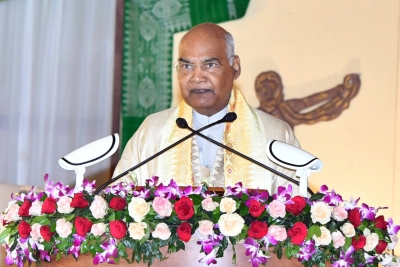By Sumit SaxenaNew Delhi, May 8 : The tenure of the current President of India, Ram Nath Kovind, is coming to an end in July this year.
The head of state is constitutionally mandated to sign on the decisions of the council of ministers headed by the Prime Minister; he is also the commander-in-chief of the Indian armed forces.
The President is not directly elected by the people, rather indirectly — through their representatives in both the Houses of Parliament, legislative assemblies of states and Union Territories.
Though the President is elected through an electoral college system — where votes are cast by national and state-level lawmakers and overseen by the Election Commission of India — the idea of having him/her elected directly through the people has not been alien to the political system.
The mode of presidential election was debated in the Constituent Assembly.K.T.Shah had proposed an amendment on December 10, 1948, suggesting the President be elected by adult citizens, instead of an indirect election.
Another member of the Constituent Assembly suggested that the President should be elected through adult suffrage, which will insulate the office of President from the vagaries of Parliamentary fortunes, and dissolution of legislative Assembly was cited as an example.
A member cited the example of the United States, where the presidential elections are held on adult suffrage — and pressed that such a system will educate the masses.
Against the backdrop of diverse political ideologies and other factors, some members emphasised that there should be a non-parliamentary executive.
Some emphasised that the person who would be at the helm of affairs and to whom so many powers and responsibilities would be bestowed, should be directly elected by the people, and the President should not be a puppet of the majority party.
However, B.R.Ambedkar had vehemently opposed these suggestions.He had said the size of the electorate is a major hurdle, making it impossible to conduct presidential elections through adult suffrage and since the President is “only a figurehead” — without actual executive power — direct elections would be superfluous.
According to Article 54 of the Constitution, the President should “be elected by an electoral college consisting of elected members of both the Houses of Parliament and the elected members of the legislative assemblies of the states”.
Article 55 provides the manner of election through proportional representation using single transferable vote.
The election of a new President is expected to be a battle of ideologies between the political parties.In the 2017 presidential elections, Meira Kumar — the candidate of the opposition camp — had said it was her battle of ideology against NDA camp’s Ram Nath Kovind.
The interesting aspect of the presidential elections is that the anti-defection law does not apply to it, and no party can issue a whip to compel its lawmakers to vote for a particular candidate.
And under such a scenario, there is a likelihood of cross-voting.
Therefore, the most sanctified exercise — the election for a head of state — is also not insulated from political manoeuvres.Presidential election can only be challenged in the Supreme Court, which constitutes a five-judge bench to hear such cases.
In fact, from the first President Rajendra Prasad to Pranab Mukherjee, every presidential election has been challenged in the Supreme Court — except the election of S.Radhakrishnan and Pratibha Patil.
Rajendra Prasad had defeated K.T.Shah — in the first presidential election — by accumulating over 80 per cent of the total votes.Prasad’s second term was also challenged, but the top court did not entertain the petition.
Zakir Hussain’s election was also challenged in the apex court.It was claimed that the then Prime Minister and Cabinet ministers influenced the lawmakers to vote for Hussain.
However, the top court had junked the petition.
The elections of the next three presidents — Fakhruddin Ali Ahmed, N.Sanjiva Reddy and Giani Zail Singh — were also challenged unsuccessfully by Supreme Court advocate-on-record Charu Lal Sahu.
He also filed a petition challenging the election of V.V.Giri, who was elected President in 1969, and also unsuccessfully challenged the elections of K.R.Narayanan and A.P.J.Abdul Kalam.The presidential election of Shankar Dayal Sharma and R.Venkataraman, as also unsuccessfully challenged by one Mithilesh Kumar Sinha.
Pranab Mukherjee’s election was also challenged by defeated candidate P.A.Sangma.It was alleged that at the time of filing of nomination, Mukherjee held an office of profit being the chairman of the council of Indian Statistical Institute in Kolkata.The Supreme Court with a 3:2 majority had ruled in favour of Mukherjee.
In its December 11, 2012 order, the top court had said, “Categorising it as an office of profit did not really make it one, since it did not provide any profit and was purely honorary in nature.”
ss/arm
#numbers #challenged #Telugu #TeluguStop #Delhi #Shankar #Lal # Radhakrishnan #Ali # Lal #Rajendra Prasad #Delhi #New Delhi #Idea
.






